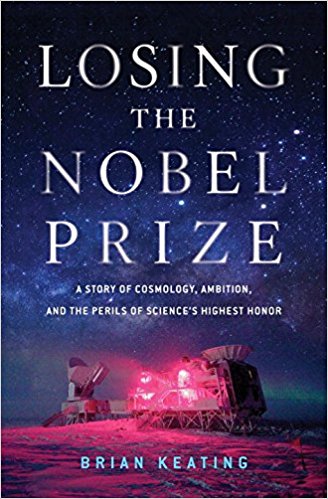 |
Losing the Nobel Prize A Story of Cosmology, Ambition, and the Perils of Science's Highest Honor
Brian Keating
W. W. Norton & Company, first edition, 2018
ISBN: 9781324000914 |
In this semiautobiographical account/denunciation, the author recounts his brush with Nobel glory and ultimate crash. Although in his case losing his chance at science's highest honor was finally caused by his experiments failing to conclusively identify the polarized cosmic microwave background (CMB) left behind from the Big Bang, his gripes with the Nobel Prize are fair. The essence of this book is to use a personal academic trajectory to explain how lust for the Nobel Prize can smudge the journey. Indeed it is no secret that many consider the Prize to be somewhat antiquated and misaligned with the modern way of doing science. For those unfamiliar with the Prize's shortfalls, the author has color coded the fore-edges of three chapters that explicitly lay them on the table: 1) Chapter 5- "Broken Lens 1: The Nobel Prize's Credit Problem", 2) Chapter 10- "Broken Lens 2: The Nobel Prize's Cash Problem", and 3) Chapter 13- "Broken Lens 3: The Nobel Prize's Collaboration Problem". I certainly feel that any science student should know about these issues, and for that reason I recommend this book. However, I should also warn that I get the sense that the lure of the Nobel Prize seems to be stronger for physicists than for biologists, so this should be kept in perspective. Oh, and if the reader does not know what CMB is, or how it fits in with the Big Bang, or what cosmology is in general, fret not, the author does a fairly good job of providing all the background the uninitiated require. True, he makes a few large leaps in logic and assumptions about what the reader already knows, but nothing that would detract from enjoying this book.
